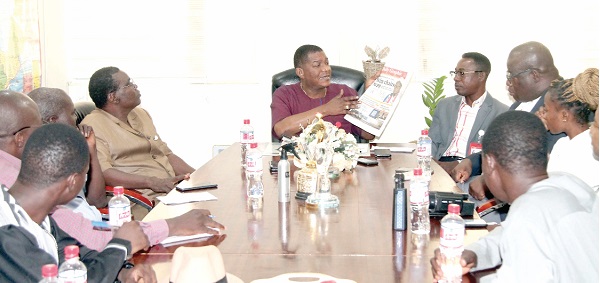
Collaborate to tell African story better - Editor
The Editor, Graphic, Kobby Asmah, has called for a deeper collaboration among media practitioners on the continent to tell the African story.
He said they could do that effectively through networking and exchange programmes that would enable them to report on developments in Africa.
Advertisement
Speaking during an educational visit by some students and faculty members, as well as journalists, from the Science and Technology Institute of Information and Communications (ISTIC), Ouagadougou, Burkina Faso, to the Graphic Communications Group Limited (GCGL), Mr Asmah said collaboration was an effective measure to change the paradigm of news about Africa and on Africa being reported by foreign journalists and media houses.
“Africa is doing pretty well; it has its ups and downs, but when we collaborate to tell the African story, it will go a long way to change the negative impression and narrative about Africa among the global community,” he said.
The group was at the GCGL to learn at first-hand the operations of the company and what it was doing to remain relevant in the face of competition.
Media
Sharing some insights into media practice in the country, Mr Asmah retraced the difficult days of the revolutionary era when it was quite difficult for the media practitioner to pursue his trade.
“It was the period described as the ‘culture of silence’ when media practitioners undertook their profession under a military regime,” the Editor stated.
He said the country transited into a democratic dispensation in December 1992 when it held a general election, with Flt Lt Jerry John Rawlings, who was the military Head of State during the revolutionary era, emerging as the first President of the Fourth Republic.
Since then, he said, the country had held eight elections, three of which resulted in a change of government from one political party to another.
Mr Asmah added that under the Fourth Republican dispensation, media practice in Ghana had blossomed, with practitioners free to go about their duties without fear.
Nonetheless, he said, there were some challenges in the media space, where ownership was now dominated by politically exposed persons, saying that development had affected standards.
The challenge of poor remuneration of practitioners was also a hindrance, as the media were unable to demand accountability from duty bearers the way the profession enjoined them to, he said.
Mr Asmah stressed the need for the training and retraining of practitioners and better incentives, including logistical needs, to equip them to truly live up to expectations.
He advised the students to showcase professionalism wherever they found themselves by being accurate, factual and fair.
He said they must also endeavour to always serve the citizens’ interest and, by extension, the national interest.
“This is the only way we can fast-track continental development and bring growth and prosperity to the people,” he said.
Newsroom
Later, the group visited the Newsroom, where the News Editor, Samuel Doe Ablordeppey, took them through the processes of news gathering and dissemination.
He explained the various specialised units, including Politics, Foreign, Business, Gender, Health, Education, Investigations, Features, Sports, among others, and how, together with the Sub and the Night Editors, compelling news content was packaged for readers.
The team of 15 students of Journalism, Communication and Technology from the ISTIC was led by the Secretary General of the institute, Arsene Evariste Kabore, along with some teachers and members of the administrative staff.
The visit was aimed at helping the students to experience the socio-economic and cultural realities of Ghana, while strengthening their knowledge of the media and other structures in the field of information and communication.
Speaking on the visit, Mr Kabore said the tour was an opportunity to showcase to the students how differently activities were undertaken in journalism and communication, as per institutions and countries.
That, he said, would help them use the knowledge from school and their experience from the educational tour outside Burkina Faso to build and better themselves in their fields of expertise.
Mr Kabore recounted the institute’s visit to the GCGL in 2016 and how privileged the team was to be back, as well as visit institutions such as the Ghana Broadcasting Corporation (GBC), the Ghana News Agency (GNA), Stratcomm Africa and the Ghana Institute of Journalism (GIJ).



